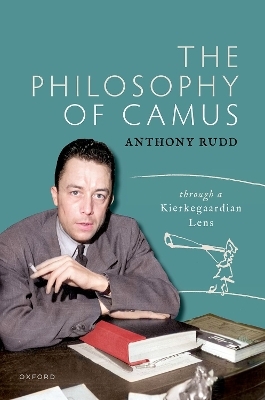
The Philosophy of Camus
Through a Kierkegaardian Lens
Seiten
2024
Oxford University Press (Verlag)
978-0-19-892483-8 (ISBN)
Oxford University Press (Verlag)
978-0-19-892483-8 (ISBN)
Rudd offers a systematic and detailed analysis of Albert Camus' underlying philosophical ideas. Comparing Camus and Kierkegaard, this book explores Camus' move from the themes of Absurdity and Revolt in his earlier work to his later exploration of the idea that our relation to non-human nature can form the basis for a non-alienated existence.
Although Albert Camus is recognised as an important novelist and political commentator, he is often still underrated as a philosopher. Camus' Philosophy, focussing on Camus' explicitly philosophical writings, provides a detailed examination of his intellectual development, and argues that his work constitutes a coherent, carefully argued meditation on central philosophical themes. A systematic comparison of Camus with Soren Kierkegaard provides an interpretive lens through which Camus' central philosophical concerns are brought into focus.
Camus' three thematic "cycles" - dealing with Absurdity, Revolt and Love/Nemesis - are compared and contrasted with Kierkegaard's three "stages of life" - the aesthetic, ethical and religious. Anthony Rudd argues that the Absurd in Camus refers primarily to an experience of the world as lacking Meaning, in a broadly religious sense, which Camus sees as entailing a radical amoralism. Rudd compares this outlook to Kierkegaard's "aestheticism", before considering the reasons for Camus' eventual rejection of Absurdist amoralism for the ethical philosophy which Camus develops in The Rebel. Camus' Philosophy raises questions, in a Kierkegaardian spirit, about whether Camus' ethics can be viable without a fuller metaphysical background than he articulates in The Rebel. Rudd concludes by considering the continuing tension between Camus' affirmation of a Meaningful order in nature and his sensitivity to suffering and evil, looking at his account of tragedy and the apparent pessimism of his last published novel, The Fall.
Although Albert Camus is recognised as an important novelist and political commentator, he is often still underrated as a philosopher. Camus' Philosophy, focussing on Camus' explicitly philosophical writings, provides a detailed examination of his intellectual development, and argues that his work constitutes a coherent, carefully argued meditation on central philosophical themes. A systematic comparison of Camus with Soren Kierkegaard provides an interpretive lens through which Camus' central philosophical concerns are brought into focus.
Camus' three thematic "cycles" - dealing with Absurdity, Revolt and Love/Nemesis - are compared and contrasted with Kierkegaard's three "stages of life" - the aesthetic, ethical and religious. Anthony Rudd argues that the Absurd in Camus refers primarily to an experience of the world as lacking Meaning, in a broadly religious sense, which Camus sees as entailing a radical amoralism. Rudd compares this outlook to Kierkegaard's "aestheticism", before considering the reasons for Camus' eventual rejection of Absurdist amoralism for the ethical philosophy which Camus develops in The Rebel. Camus' Philosophy raises questions, in a Kierkegaardian spirit, about whether Camus' ethics can be viable without a fuller metaphysical background than he articulates in The Rebel. Rudd concludes by considering the continuing tension between Camus' affirmation of a Meaningful order in nature and his sensitivity to suffering and evil, looking at his account of tragedy and the apparent pessimism of his last published novel, The Fall.
Anthony Rudd studied philosophy at the Universities of Cambridge, St Andrews and Oxford before taking his PhD at Bristol. He retired recently from the Philosophy Department at St Olaf College, Minnesota, USA, having previously taught at the University of Hertfordshire in the UK. He is the author of Kierkegaard and the Limits of the Ethical (1993); Expressing the World: Skepticism, Wittgenstein and Heidegger (2003); Self, Value and Narrative: A Kierkegaardian Approach (2012) and Painting and Presence: Why Paintings Matter (2022) as well as numerous articles.
Preface
Note on References
I: Introduction
1: The Absurd
2: Rebellion
3: Nemesis
Conclusion
Bibliography
Index
| Erscheint lt. Verlag | 12.12.2024 |
|---|---|
| Verlagsort | Oxford |
| Sprache | englisch |
| Maße | 156 x 234 mm |
| Themenwelt | Geisteswissenschaften ► Philosophie ► Ethik |
| Geisteswissenschaften ► Philosophie ► Philosophie der Neuzeit | |
| ISBN-10 | 0-19-892483-6 / 0198924836 |
| ISBN-13 | 978-0-19-892483-8 / 9780198924838 |
| Zustand | Neuware |
| Informationen gemäß Produktsicherheitsverordnung (GPSR) | |
| Haben Sie eine Frage zum Produkt? |
Mehr entdecken
aus dem Bereich
aus dem Bereich


